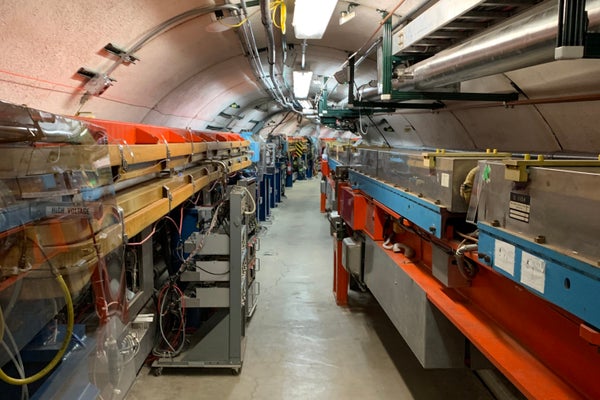Trump’s Cornell Funding Freeze Could Make U.S. Troops Less Safe
Cornell is being slammed with stop-work orders that will seriously impact department of defense research linked to the Air Force and military safety, sources tell Scientific American

Cornell’s Electron Storage Ring (CESR) is a particle accelerator that is used as an x-ray source for the Cornell High Energy Synchrotron Source.
Cornell Wilson Wilson Synchrotron Lab
Cornell University has been slammed with stop-work orders on more than 75 Department of Defense grants that support research into robotics, superconductors and military safety, university officials said on Tuesday.
Among the affected projects is a joint research effort between the Cornell High Energy Synchrotron Source (CHESS) and the Air Force Research Lab, Scientific American has learned.
How are funding freezes impacting universities?
On supporting science journalism
If you’re enjoying this article, consider supporting our award-winning journalism by subscribing. By purchasing a subscription you are helping to ensure the future of impactful stories about the discoveries and ideas shaping our world today.
The freeze placed on these grants is part of a pattern of stop-work orders and threats to withhold funding that the federal government has issued to several universities over campus protests and diversity, equity and inclusion (DEI) efforts.
The New York Times reported that the Cornell grant freeze has gone far beyond DOD funding and has affected grants from the Department of Agriculture and the Department of Health and Human Services. The university is being investigated by the Department of Education for allegations of antisemitism related to pro-Palestinian protests and of DEI efforts that the administration considers discriminatory. Cornell is one of 60 universities put on a list by the education department in March. Northwestern University was also subject to a funding freeze on Tuesday, according to the university’s student newspaper.
Previously, Columbia University agreed to review its admissions procedures, ban face masks for the purpose of concealing one’s identity on campus and put its department of Middle Eastern, South Asian and African studies under a receivership, which is supervision from an authority outside the department, among other concessions.
What Cornell research is impacted by the new funding freeze?
In a recent statement, Cornell leaders said the grants affected “research into new materials for jet engines, propulsion systems, large-scale information networks, robotics, superconductors, and space and satellite communications, as well as cancer research—work of significance for our national defense, the competitiveness of our economy, and the health of our citizens.” A spokesperson for the university declined to offer further detail.
Scientists with knowledge of CHESS, however, said that the frozen funding includes monay from the Air Force Research Laboratory for the Materials Solutions Network at CHESS (MSN-C), a pair of x-ray stations that analyze metals and polymers used in military aircraft, electronics and armor plating. These DOD projects will pause under the stop-work order. The high-energy, high-intensity x-rays produced by Cornell’s synchrotron can only be made in a few facilities around the world. That means the move could significantly affect the U.S. military’s ability to design and test new materials. The beam is also used to investigate unexplained failures in materials that are already in use in planes and other military equipment. The agreement between CHESS and the Air Force Research Laboratory meant that the Department of Defense had priority for projects most crucial to its needs, such as finding ways to manufacture safe but ultra-light airplane parts or ways to 3D print components for replacement parts on far-flung bases or even from sea.
In addition, the Air Force funding for MSN-C supported a large portion of CHESS’s core operating expenses, which means the facility will not be able to begin any new non-DOD projects, sources told Scientific American.
What comes next?
In its recent statement, Cornell’s administration said it was actively seeking to learn more about the basis for the funding freeze from federal officials. University officials at Cornell will likely be watching Columbia’s example: though the latter university agreed to many of the Trump administration’s demands on March 21, and Secretary of Education Linda McMahon told CNN Columbia was “on the right track” to restore its federal funding on March 23, the university is now facing deeper cuts. Science Magazine reported today that the National Institutes of Health (NIH) will now stop all funding to the university, including for existing grants. In 2024, according to Science, Columbia received $690 million from the NIH.




